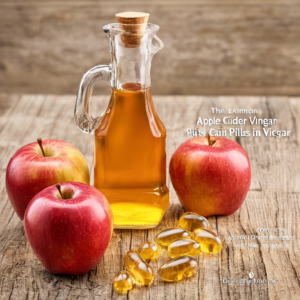Have you ever wondered how long apple cider vinegar can last and how to properly store it to extend its shelf life? Apple cider vinegar is a versatile ingredient known for its numerous health benefits and culinary uses. In this article, we will explore some practical tips and tricks to help you store your apple cider vinegar properly and ensure its freshness and potency for a longer period of time. From the best storage methods to understanding the signs of spoilage, we’ve got you covered in making the most out of your apple cider vinegar. So, let’s dive in and uncover the secrets to prolonging the shelf life of this beloved pantry staple.

Choosing the Right Storage Container
Glass or Plastic?
When it comes to storing apple cider vinegar, one of the first decisions you need to make is whether to use a glass or plastic container. Both options have their pros and cons, so it ultimately depends on your personal preference. Glass containers are sturdy, non-reactive, and can help preserve the flavor and quality of the vinegar. Plastic containers, on the other hand, are lightweight and less prone to breaking. However, it is important to choose a high-quality, food-grade plastic container to avoid any potential chemical leaching.
Dark or Clear?
The next consideration is whether to opt for a dark or clear storage container. Apple cider vinegar is sensitive to light, so choosing a dark container, such as amber glass or an opaque plastic, can help protect it from UV exposure. Light can degrade the vinegar and lead to a reduced shelf life, which is why it is often recommended to store it in a dark container.
Sealed or Ventilated?
Another factor to consider is whether to use a sealed or ventilated container. Sealed containers help prevent air and moisture from entering, which can help maintain the vinegar’s quality and freshness. On the other hand, a ventilated container can allow for better airflow and prevent the buildup of condensation that could potentially impact the vinegar’s flavor. Ultimately, the choice between a sealed or ventilated container depends on the storage conditions and your preference.
Storing Apple Cider Vinegar at Room Temperature
Choose a Cool and Dark Place
To ensure the longevity of your apple cider vinegar, it is essential to choose an appropriate storage location. Ideally, you should store it in a cool and dark place. Heat and sunlight can accelerate the degradation process, leading to a shorter shelf life. Therefore, it is best to find a spot in your pantry or kitchen cabinet away from direct light and heat sources, such as the stove or appliances.
Keep Away from Heat Sources
Heat is one of the main enemies of apple cider vinegar. Exposure to high temperatures can cause the vinegar to spoil faster and lose its potency. Therefore, it is vital to keep it away from heat sources, such as sunlight, stovetops, and ovens. Additionally, avoid storing it near other heat-emitting appliances, as the heat they generate can impact the vinegar’s quality.
Avoid Exposure to Light
As mentioned earlier, apple cider vinegar is sensitive to light. Exposure to sunlight and artificial light can degrade the vinegar’s quality over time. Therefore, it is crucial to store it in a dark place, away from direct light sources. You can opt for a dark storage container or place the container in a cupboard or pantry where it is shielded from light.
Refrigerating Apple Cider Vinegar
Benefits of Refrigeration
While apple cider vinegar can be stored at room temperature, refrigeration offers several benefits. Refrigerating apple cider vinegar helps slow down the natural fermentation process, thus preserving its flavor and potency for a longer period. The cooler temperature inhibits the growth of bacteria and extends the shelf life of the vinegar. Additionally, refrigeration can help maintain its freshness and taste, especially if you live in a hot and humid climate.
Proper Refrigeration Tips
When refrigerating apple cider vinegar, it is important to use a tightly sealed container. This prevents any odors from other foods in the refrigerator from being absorbed by the vinegar. You can transfer the vinegar to a glass or plastic container specifically designed for refrigeration or keep it in its original bottle, ensuring a tight seal. It is also recommended to store the vinegar towards the back of the refrigerator, away from the door, to minimize temperature fluctuations. Remember to label the container with the date of storage to keep track of its freshness.
Freezing Apple Cider Vinegar
Can Apple Cider Vinegar Be Frozen?
While apple cider vinegar can be refrigerated, freezing it is not recommended. Vinegar has a high water content, and water expands when frozen, causing the vinegar to expand and potentially break the glass or plastic container. Freezing may also alter the vinegar’s flavor and consistency, affecting its overall quality. Therefore, it is best to avoid freezing apple cider vinegar.
Freezing Tips and Tricks
If you still wish to freeze apple cider vinegar, you can pour it into ice cube trays. Freezing small portions in ice cube trays allows you to easily thaw and use the desired amount without exposing the entire bottle to temperature fluctuations. However, keep in mind that the thawed vinegar may have a slightly different taste and texture. It is crucial to thaw it properly in the refrigerator and use it promptly.
Checking for Spoilage
Color Changes
When checking for spoilage in apple cider vinegar, start by observing any noticeable color changes. Fresh apple cider vinegar typically has a clear or amber color. If you notice any unusual cloudiness, discoloration, or a significant change in hue, it could be a sign of spoilage. Cloudiness or sedimentation may be an indication of bacteria growth or fermentation, and the vinegar should not be consumed if these signs are present.
Odor Changes
Another important factor to consider when checking for spoilage is the vinegar’s odor. Apple cider vinegar has a distinct, tangy smell. If you detect any foul or rancid odors, it could be an indication that the vinegar has spoiled. Spoiled apple cider vinegar may have a vinegar-like scent, but if it smells off or unpleasant, it is best to discard it and replace it with a fresh bottle.
Sedimentation
Sedimentation refers to the presence of particles or solids at the bottom of the vinegar. While some sedimentation is normal and can occur due to the natural fermentation process, an excessive amount could be a sign of spoilage. If the vinegar appears hazy or there is an unusual amount of sediment, it is advisable to dispose of it, as it may harbor harmful bacteria.
Mold Growth
Mold growth is a clear indication of spoilage. If you notice any mold on the surface of the vinegar or inside the bottle, it should not be consumed. Mold can produce toxins that are harmful to human health, so it is essential to discard any vinegar showing signs of mold growth.
Factors Affecting Shelf Life
Quality of Initial Product
The quality of the apple cider vinegar you start with plays a significant role in determining its shelf life. Opting for high-quality, unfiltered, and organic apple cider vinegar can contribute to a longer shelf life compared to lower-quality varieties. It is important to read the label and choose a reputable brand that uses fresh, locally sourced apples and follows proper production processes.
Acetic Acid Content
The acetic acid content in apple cider vinegar also affects its shelf life. A higher concentration of acetic acid acts as a natural preservative, inhibiting the growth of bacteria and helping to prolong the vinegar’s freshness. When purchasing apple cider vinegar, check the label for the exact acetic acid percentage, as higher concentrations typically indicate a longer shelf life.
Exposure to Air and Light
Exposure to air and light can accelerate the degradation of apple cider vinegar. Oxygen and UV light can cause the vinegar to deteriorate and lose its potency over time. It is crucial to choose a storage container that is airtight and opaque to protect the vinegar from excessive air and light exposure. Additionally, it is advisable to seal the container properly after each use to minimize oxidation.
Temperature Variations
Temperature variations can also impact the shelf life of apple cider vinegar. Fluctuating temperatures, especially exposure to excessive heat or extreme cold, can accelerate the vinegar’s spoilage. It is important to store the vinegar in a stable environment, avoiding areas where temperatures fluctuate significantly. This ensures the vinegar remains at a consistent temperature, helping to preserve its quality for a longer period.

Using Preservatives and Additives
Should You Add Preservatives?
While preservatives can potentially extend the shelf life of apple cider vinegar, additives are generally not necessary for properly produced and well-packaged vinegar. High-quality apple cider vinegar does not require preservatives, as the acetic acid and low pH naturally inhibit the growth of harmful bacteria. It is best to choose a pure and unadulterated apple cider vinegar without added preservatives or unnecessary additives.
Common Additives and Their Effects
If you encounter apple cider vinegar with added preservatives or additives, it is important to understand their potential effects. Preservatives, such as sulfates or sodium benzoate, may help inhibit bacterial growth but can also cause allergic reactions in some individuals. Adding unnecessary additives, such as sugars or artificial flavors, can alter the vinegar’s flavor and nutritional profile. It is advisable to opt for a pure and natural apple cider vinegar without any unnecessary additives.
Tips for Prolonging Shelf Life
Keep the Bottle Sealed
To maximize the shelf life of your apple cider vinegar, always ensure the bottle is tightly sealed after each use. This prevents air from entering and minimizes the risk of oxidation and bacterial growth. A properly sealed container helps maintain the vinegar’s freshness and potency over time.
Use Clean Utensils
When using apple cider vinegar, it is important to use clean utensils to avoid any contamination. Using dirty or contaminated utensils can introduce bacteria or other contaminants into the vinegar, hastening spoilage. Always rinse utensils, such as measuring spoons or pouring cups, with hot water before using them with apple cider vinegar.
Avoid Contamination
In addition to using clean utensils, it is crucial to prevent any contamination during storage. Avoid touching the spout or inside of the bottle with dirty hands or utensils. This reduces the introduction of bacteria or other contaminants, ensuring the vinegar remains fresh for longer. It is best to pour the vinegar into a separate cup or measuring spoon rather than directly touching the bottle to other food or surfaces.
Avoid Extreme Temperatures
Extreme temperatures can significantly impact the shelf life of apple cider vinegar. Avoid exposing the vinegar to excessive heat or freezing temperatures, as this can accelerate spoilage and degradation. Additionally, storing the vinegar in areas where the temperature fluctuates frequently, such as near a stove or microwave, should be avoided. Maintaining a stable temperature environment helps preserve the vinegar’s quality.
Reviving and Using Expired Apple Cider Vinegar
Determining if It Is Safe to Use
If you come across a bottle of apple cider vinegar that has exceeded its recommended shelf life, you may wonder if it is still safe to use. While expired apple cider vinegar may not be harmful, its quality and potency may be compromised. To determine if it is safe to use, perform the sensory checks mentioned earlier, such as inspecting for color changes, odor changes, sedimentation, and mold growth. If the vinegar passes these checks, it may still be used, but its effectiveness and flavor may differ from fresh vinegar.
Potential Uses for Expired Apple Cider Vinegar
Even if your apple cider vinegar has expired, there are still various ways to utilize it. Expired vinegar can be used for cleaning purposes, as a household cleaner or natural disinfectant. It can also be used as a natural hair rinse, skincare ingredient, or even as a weed killer in your garden. However, it is important to note that expired vinegar may not be as effective as fresh vinegar and may not yield the same results.
Conclusion
Choosing the right storage container and employing proper storage methods are crucial for maintaining the quality and shelf life of apple cider vinegar. Whether you choose glass or plastic, dark or clear containers, or opt for refrigeration or room temperature storage, taking care to protect the vinegar from heat, light, and air is essential. By following the recommended guidelines and proper storage practices, you can enjoy the benefits of apple cider vinegar for an extended period and ensure its freshness and effectiveness in various culinary and household applications.





